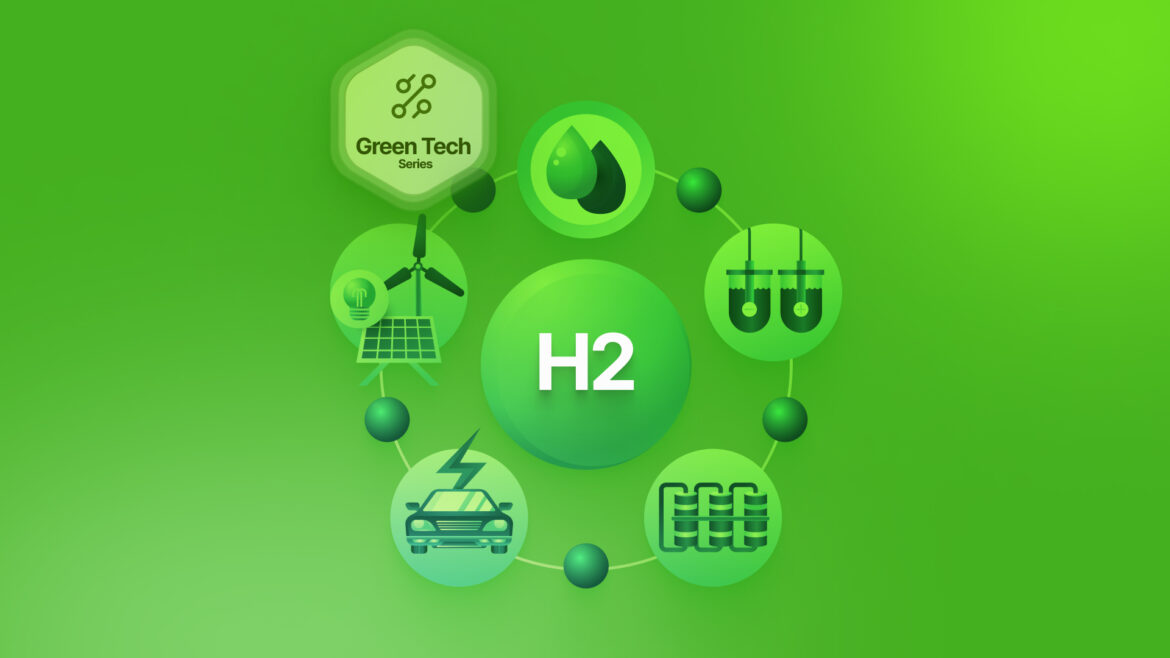As the climate crisis deepens, the transition to green energy is not just a choice but a necessity for a sustainable future. In this pursuit, green hydrogen – a clean and versatile energy carrier – is carving out a significant role, especially in the world of sustainable transport. Produced using renewable energy sources, green hydrogen holds the potential to reduce carbon emissions drastically, providing a tangible solution to environmental concerns.
Begin Your Digital Transformation Journey
Customized Strategies to Lead Your Business into the Digital Age
Explore Digital TransformationIt’s no wonder that the global green hydrogen market is experiencing explosive growth. According to Allied Market Research, the market size, which was valued at $0.3 billion in 2020, is projected to reach an astounding $9.8 billion by 2028. This represents an impressive compound annual growth rate (CAGR) of 54.7% from 2021 to 2028.
However, the journey of hydrogen from production to its use in transportation could be more complex. It entails complex processes such as efficient production, secure storage, and seamless distribution, each requiring precise management to ensure optimal utilization. That’s where software solutions come into play.
Just as green hydrogen redefines our approach to fuel, innovative software solutions are reshaping how we manage this green resource. In the upcoming sections, we will delve into the significant role of software in the production, storage, and distribution of green hydrogen for transport. We’ll uncover how digital tools can streamline these processes, bolstering the drive towards a greener, more sustainable world.
The Role of Hydrogen in Sustainable Transport
H2 is rapidly emerging as a potent player in the sustainability sector, particularly in the realm of transportation. But why is it gaining such a formidable reputation in sustainable transport?
Unlike fossil fuels, green hydrogen production doesn’t emit harmful greenhouse gases. It’s an efficient energy carrier that can be produced using renewable energy sources like wind and solar power. When used in fuel cells of electric vehicles, it only emits water, making it an environmentally friendly alternative.
Moreover, hydrogen’s energy density is notably higher than that of electric batteries. This means vehicles running on H2 can travel longer distances without refueling and refuel faster, thus making it an enticing option for heavy-duty transport such as trucks, buses, and ships.
Green hydrogen also promises a circular economy in the transport sector, where waste from one process can be used as a resource in another. For instance, excess renewable energy can be utilized to produce green hydrogen, which can later power transport, reducing waste and enhancing overall energy efficiency.
However, the crux of unlocking green hydrogen’s full potential in transport lies in effectively managing its production, storage, and distribution. In the next section, we’ll explore how software solutions can help optimize these processes and pave the way for a greener transport future.
The Importance of Software in H2 Production, Storage, and Distribution
Software solutions play a pivotal role in the journey of green hydrogen, from its creation to its role as a fuel in transport systems. Leveraging advanced technologies, these solutions are the linchpins in effectively handling the complex dynamics of green hydrogen production, storage, and distribution.
Experience the Power of Custom Software Development
Transformative Software Solutions for Your Business Needs
Explore Custom Software- Production: Producing green hydrogen involves a process known as electrolysis, where water is split into hydrogen and oxygen using electricity. Software plays a crucial role in monitoring and controlling this process. It helps manage the inputs, optimize energy usage, and predict outcomes based on various factors such as electricity costs and demand. Machine learning algorithms can further enhance these predictions, leading to more efficient and cost-effective production.
- Storage: H2 storage demands accuracy and safety. Software solutions enable monitoring storage conditions, ensuring hydrogen is safely contained and ready for distribution when needed. By gathering data on factors such as pressure, temperature, and volume, software can help maintain the optimal conditions for hydrogen storage, reducing risks and maintaining efficiency.
- Distribution: The distribution of green hydrogen is a logistical challenge. It requires careful coordination to ensure the right amounts reach the right places at the right times. Advanced software systems can map out the most efficient distribution routes, manage transport logistics, and predict future demand based on historical data and trends.
From a broader perspective, software solutions offer an integrated platform where production, storage, and distribution processes can be holistically managed. Real-time analytics, cloud-based accessibility, and smart automation features further enhance operational efficiency and decision-making capabilities in the green hydrogen supply chain. In the next section, we’ll look into how this software-hydrogen interplay shapes the future of sustainable transport.
The Future of Green Hydrogen and Software Interplay
As more industries and governments worldwide recognize the importance of transitioning to sustainable energy, the demand for green hydrogen will surge. Consequently, the need for sophisticated software solutions to manage green hydrogen production, storage, and distribution will also rise.
Looking toward the future, we can expect software development in this sector to focus on incorporating advanced technologies such as AI, machine learning, and blockchain. AI and machine learning will enable more precise forecasting and optimization in green hydrogen production, while blockchain can ensure transparency and traceability in the distribution process.
Furthermore, integrating IoT devices with software solutions could revolutionize green hydrogen storage. Sensors could continuously monitor storage conditions, providing real-time data to software platforms for analysis and decision-making.
As a result, these innovations in software development will play a pivotal role in advancing the use of green hydrogen, making the transport industry more sustainable and efficient. Now, let’s take a look at some real-world examples where software solutions have significantly improved green hydrogen production and distribution.
IT Consultancy for Strategic Advantage
Tailored IT Solutions to Drive Your Business Forward
Discover IT ConsultingCase Studies: Software Optimization in H2 Production and Distribution
As the concept of hydrogen gains traction, several initiatives worldwide demonstrate software solutions’ significant role in managing its production, storage, and distribution.
Example 1 – Hydrogen Optimized: This Canadian startup has developed advanced software to control and optimize the process of large-scale green hydrogen production. Their RuggedCell water electrolysis system leverages software to monitor the operation, adjust to variable renewable power inputs, and maximize production rates, enhancing overall efficiency.
Example 2 – Energy Observer Developments (EODev): EODev, in collaboration with a software company, developed the GEH2® system, a solution for producing and storing hydrogen. This software-controlled system is capable of adapting to different energy inputs and can automatically switch to the most efficient operating mode, demonstrating how software can optimize hydrogen production and storage.
Example 3 – H2-Share Project in Europe: This EU-funded project aims to build and test a 27-tonne hydrogen-powered truck for distributing green hydrogen. The vehicle’s performance is continuously tracked and analyzed using software solutions, enabling the development of an efficient, scalable green hydrogen transport model.
Custom-Fit Web Development for Your Business
Tailored Web Development Solutions for Your Unique Needs
Discover Web DevelopmentThese examples highlight the transformative impact of software on the green hydrogen sector. They showcase how integrating software can optimize green hydrogen production, ensure safe storage, and facilitate efficient distribution. Let’s wrap up by looking at the overall picture.
Wrapping Up: The Pivotal Role of Software in Green Hydrogen’s Sustainable Transport Future
The journey towards a sustainable future in transport is no longer a distant dream, thanks to the symbiotic relationship between green hydrogen and software solutions. As we’ve explored, green hydrogen is poised to revolutionize the transport sector with its green, efficient, and versatile nature. However, to unlock its full potential, managing its lifecycle – production, storage, and distribution – effectively is critical. That’s where innovative software solutions come into play.
These digital tools, powered by advanced technologies such as AI, Machine Learning, and IoT, are instrumental in optimizing and streamlining green hydrogen operations. They promise an integrated, efficient, and smartly managed green hydrogen supply chain – from electrolyzers to vehicle fuel cells.
As we step into a future where green hydrogen becomes the norm in transport, the importance of such software solutions will only escalate. They will be enablers and catalysts, driving the green revolution in the transport sector and beyond.
Invest in Professional UX/UI Design to Create Impactful Interfaces
Designing Seamless User Journeys That Boost Interaction and Conversion Rates
Discover UI/UX DesignAt HyperSense, we understand the significance of this green-software synergy. Our expertise lies in developing tailored software solutions for green tech and sustainability. If you’re keen to explore the potential of green hydrogen for your project or want to understand how software can elevate your green-tech initiatives, feel free to contact us. Let’s together pave the way for a sustainable, green future.










